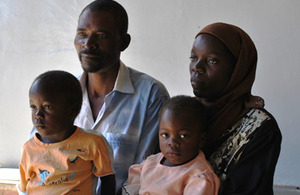Proof positive - medicine for a healthy life in Malawi
How UK aid is helping to lower the price of HIV treatment

The Magadi family alive and well thanks to HIV treatment. Picture: Julianne Guariglia/Clinton Health Access Initiative (CHAI)
A test of courage
Josephy and Otilia Magadi and their twins Mphatso and Chisomo, age 4, live in the Machinga District of Malawi. Two years ago, Chisomo’s health began to rapidly decline - despite her parents’ efforts, she was just not getting better. Otilia brought her to the nearest health centre, where she was diagnosed with severe acute malnutrition. Chisomo’s case was so bad that the clinic referred her to the hospital for immediate treatment and suggested she take an HIV test.
Otilia recalls that she was nervous to have Chisomo tested. HIV still carries a stigma, but Otilia’s main concern was access - she knew of cases in the past where children had trouble getting the antiretoviral drugs they needed if they tested positive. Her fear brought to light the issue of how testing with no treatment can make someone feel helpless and that testing itself is pointless. However Otilia learned from the hospital staff that the drugs would be readily available and easy for her daughter to take. The staff also explained importance of starting an HIV positive child on treatment. Otilia agreed and Chisomo was tested. She was found HIV positive and was immediately put on treatment. Hospital staff also recommended that her twin brother Mphatso immediately be tested for HIV, along with both parents.
The road to recovery
Josephy, Otilia, and Mphasto all tested positive for HIV. Their decision to get tested was driven both because they saw how sick Chisomo was, and because doctors and nurses helped them to understand the importance of being on treatment. Josephy was pleased to witness the significant improvement in Chisomo’s health once she started on treatment; he reported that her improved health really demonstrated to him the power of antiretroviral drugs.
As of May 2011, Josephy, Otilia, Chisomo, and Mphasto are all healthy. The twins have been on treatment for nearly 2 years and are thriving. The family’s long-term prognosis is a good one, and thanks to the efforts of the UK funded Clinton Health Access Initiative (CHAI) and others, it is improving each day.
A life more ordinary
Otilia recently explained how easy it was for her to access and keep her entire family on treatment. She reported that the drugs are always readily available. She is happy that she and her family were tested: she now has happy, healthy children; she knows if she had not gotten them tested they would likely not be alive today.
Otilia explains that the health centre staff and her family’s expert clinician told her that if her CD4 count remains good, she stays on treatment, and enrolls in the prevention of mother to child transmission program, she and Josephy could have another child that would be HIV negative.
The prevention of mother to child transmission (PMTCT) pilot programme, which CHAI piloted in partnership with Malawi’s Ministry of Health, offers Otilia and her family the entire continuum of care under one roof: ARV drug treatment, an ante-natal clinic and diagnostics, community outreach, psychosocial support, post-natal and follow up for mother and child. Since CHAI began this work in Machinga in 2009, there has been a 50% decrease in mother-to-child transmission at 6 weeks following birth and a 35% decrease in at the 18 month mark.
Not only will Chisomo and Mphasto grow up healthy, happy, and on treatment, but Josephy and Otilia, and their future children, will also be able to live long and productive lives.
How we are helping
DFID is a major supporter of CHAI and its access to medicines programme. CHAI works closely with suppliers of key antiretroviral (ARV) drugs to identify opportunities to achieve price reductions, leading to significant cost savings for developing country governments.
The cost savings were made possible by building demand for new products, which stimulates market competition and leads to volume-based discounts, while collaborating with suppliers to achieve cost reductions through more efficient manufacturing processes and sourcing of raw materials.
Today, thanks in large measure to UK-funded efforts, 3.9 million people benefit from life-saving ARV drugs purchased at reduced prices, representing well over two-thirds of all people living with HIV and on treatment in developing countries.
Recent global progress
In May 2011, DFID and CHAI, together with UNITAID, announced further price reductions on key ARV drugs. Since 2008, this partnership has achieved price reductions that will generate global savings of at least $600 million over the next three years, making HIV treatment more widely accessible and saving countless lives.
In addition, these recent price reductions will make preferred, first-line ARV drugs like tenofovir (TDF) and efavirenz (EFV) more readily available. Until recently, regimens based on these drugs have been prohibitively expensive for wide use in developing countries. In 2008, low-income countries paid an average annual cost of $400 per patient per year for a once-daily combination regimen including TDF and EFV. This regimen is now available at an annual per patient cost of less than $159, a reduction of 60%.
Treatment options for the Magadi family and others will soon be further improved, when the government of Malawi takes advantage of the increased accessibility of TDF and EFV by introducing a new national drug regimen. The government aims to ensure that this new regimen will be accessible to Malawi’s entire population of people on treatment for HIV and AIDS, and offer a lower daily pill burden for patients, making adherence to treatment far more likely.
Just the beginning
We will continue to work with the Clinton Health Access Initiative to generate cost savings to buy medicines for 500,000 more people by 2015. This commitment forms just one part of our recently published strategy on tackling HIV in the developing world - Towards zero infections.